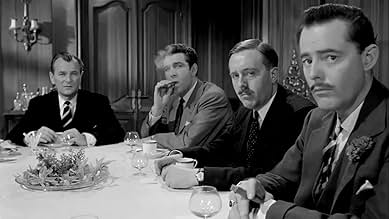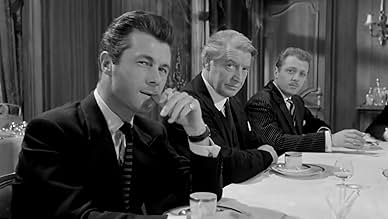IMDb RATING
7.2/10
5.6K
YOUR RATING
A disgruntled veteran recruits a group of disgraced colleagues to perform a bank robbery with military precision.A disgruntled veteran recruits a group of disgraced colleagues to perform a bank robbery with military precision.A disgruntled veteran recruits a group of disgraced colleagues to perform a bank robbery with military precision.
- Nominated for 1 BAFTA Award
- 1 win & 1 nomination total
John Adams
- Police Constable in Final Scene
- (uncredited)
- Director
- Writers
- All cast & crew
- Production, box office & more at IMDbPro
Featured reviews
A British army colonel, pensioned off and embittered, assembles a motley group of specialist, criminal and deviant ex-officers who share his bitterness. He has in mind a bank robbery. They arm themselves, courtesy of their former employer, then execute the robbery impeccably, right in the centre of the City of London. The bags of loot are filled, but, at the pictures, crime seldom pays....
That this film has been reviewed as a comedy demonstrates, once again, that British and American are two cultures disguised by a common language. The humour here, of that characteristically British sardonic kind, is incidental to a drama of frustration, disappointment and inadequacy. The humour is just the way the British speak.
The clever and low key "raid" on the army training centre is finely done. So much so that it overshadows the robbery itself and therefore slightly unbalances the action.
This is one of those films, craftsmanlike and enjoyable, yet not desperately exciting, that finds its greatest value precisely in being a period piece. The League of Gentleman is a fascinating social document. Made in 1959, it catches the moment in British history when, as its Empire dissolved, the social infrastructure that supported it and that had made Colonel Hyde what he had been, also disintegrated. This aspect could almost have been deliberate, explaining the very long opening sequence (another unbalancing factor) that introduces us to the seven main characters. There are shockingly frank moments: the honourable man with the overtly promiscuous wife; the gigolo; the religious fraudster (or pervert - the message is obscured); another of the heroes an "other man", a homosexual; the pressure of life in a small house with a loud television set. So, too, the casualness with which machine guns are used in a robbery by men trained in the code of gentlemen. The dull and seedy presentation of Hyde's home and base, large but far from grand, is further evidence of the decline of his class. So, too, a robbery that was intended as a hymn to the effectiveness of military planning, brought to naught by one stupid mistake and a small boy.
Yet this is not a sententious film, their is no preaching, none of that British nostalgia for the old ways, but almost a respect for the robbers and a recognition that life had to become more ruthless as a stiff society began to flex. How it was elsewhere, I do not know, but this watchable film will show anyone what was happening in Britain just before the Sixties began to swing.
That this film has been reviewed as a comedy demonstrates, once again, that British and American are two cultures disguised by a common language. The humour here, of that characteristically British sardonic kind, is incidental to a drama of frustration, disappointment and inadequacy. The humour is just the way the British speak.
The clever and low key "raid" on the army training centre is finely done. So much so that it overshadows the robbery itself and therefore slightly unbalances the action.
This is one of those films, craftsmanlike and enjoyable, yet not desperately exciting, that finds its greatest value precisely in being a period piece. The League of Gentleman is a fascinating social document. Made in 1959, it catches the moment in British history when, as its Empire dissolved, the social infrastructure that supported it and that had made Colonel Hyde what he had been, also disintegrated. This aspect could almost have been deliberate, explaining the very long opening sequence (another unbalancing factor) that introduces us to the seven main characters. There are shockingly frank moments: the honourable man with the overtly promiscuous wife; the gigolo; the religious fraudster (or pervert - the message is obscured); another of the heroes an "other man", a homosexual; the pressure of life in a small house with a loud television set. So, too, the casualness with which machine guns are used in a robbery by men trained in the code of gentlemen. The dull and seedy presentation of Hyde's home and base, large but far from grand, is further evidence of the decline of his class. So, too, a robbery that was intended as a hymn to the effectiveness of military planning, brought to naught by one stupid mistake and a small boy.
Yet this is not a sententious film, their is no preaching, none of that British nostalgia for the old ways, but almost a respect for the robbers and a recognition that life had to become more ruthless as a stiff society began to flex. How it was elsewhere, I do not know, but this watchable film will show anyone what was happening in Britain just before the Sixties began to swing.
This movie is an involving, intriguing and ultimately poignant heist thriller. Since the advent of a comedy TV show which took it's name, the TV Guides have taken to describing this film as a 'comedy'. Obviously they've never watched it - the moral is, get your movie info from IMDB, not a rubbish newspaper or magazine TV Guide.
The movie's premise is good - a disenchanted ex-army officer dispairs of success on 'civvy street' so decides to organize his own squad of former soldiers and pull off a military operation with a difference - they will rob a bank. This film was the inspiration to the real-life Great Train Robbery, which involved a 20-man gang stealing £3,500,000 in 1963.
Characterization is good and believable; as with all British movies of the era, there is an excrutiating tendency to overly-ingenious rhetoric, one wonders sometimes how they think of such witty remarks. That aside, it's thoroughly convincing. The film code of the day of course required that no film could ever show a criminal benefiting from his crime, but instead of the usual tiresome accidental spilling of the booty out of a train/car/plane window, we have a more realistic, and indeed somewhat sad resolution.
Yes, it is a bit old now, but if you can hang-up your hang-ups about that, you may find yourself pleasantly surprised.
The movie's premise is good - a disenchanted ex-army officer dispairs of success on 'civvy street' so decides to organize his own squad of former soldiers and pull off a military operation with a difference - they will rob a bank. This film was the inspiration to the real-life Great Train Robbery, which involved a 20-man gang stealing £3,500,000 in 1963.
Characterization is good and believable; as with all British movies of the era, there is an excrutiating tendency to overly-ingenious rhetoric, one wonders sometimes how they think of such witty remarks. That aside, it's thoroughly convincing. The film code of the day of course required that no film could ever show a criminal benefiting from his crime, but instead of the usual tiresome accidental spilling of the booty out of a train/car/plane window, we have a more realistic, and indeed somewhat sad resolution.
Yes, it is a bit old now, but if you can hang-up your hang-ups about that, you may find yourself pleasantly surprised.
This 1959 (or 1960) film shares the same title as the 1990's comedy about weird northern folk, but is a far more savage satire of decay in the establishment.
A redundant Colonel recruits a unit of marginally more corrupted subordinate Army officers, to stage an American Style heist, based on a US pulp fiction novel. Very few of the characters would initially be associated with the establishment. Their past failings include treason, war-crimes and negligence resulting in deaths.
Jack Hawkins (Colonel Hyde) knits the characters together over the course of the film. By reinventing a form of army discipline the characters appear to rediscover their aplomb.
The actual robbery is almost incidental, occupying ~ 10% of the film.
My real fascination was with the development and interaction of the characters. Even 40 years on their callousness is at times shocking and the 'Blame Ireland' example of scapegoating still resonates, especially in the context of the characters' personal failures in other theatres of the ex-empire.
The film is nearly 2 hours long, but seemed much shorter. Post war film of the City of London (and elsewhere) before 60s redevelopment is a bonus.
A redundant Colonel recruits a unit of marginally more corrupted subordinate Army officers, to stage an American Style heist, based on a US pulp fiction novel. Very few of the characters would initially be associated with the establishment. Their past failings include treason, war-crimes and negligence resulting in deaths.
Jack Hawkins (Colonel Hyde) knits the characters together over the course of the film. By reinventing a form of army discipline the characters appear to rediscover their aplomb.
The actual robbery is almost incidental, occupying ~ 10% of the film.
My real fascination was with the development and interaction of the characters. Even 40 years on their callousness is at times shocking and the 'Blame Ireland' example of scapegoating still resonates, especially in the context of the characters' personal failures in other theatres of the ex-empire.
The film is nearly 2 hours long, but seemed much shorter. Post war film of the City of London (and elsewhere) before 60s redevelopment is a bonus.
Jack Hawkins, excellent as always, heads a superb cast in this marvelously entertaining look at the moral decay of Britain's upper classes in the post-war period. Some of Britain's greatest film talent was at work on this project, including screenwriter Bryan Forbes, director Basil Dearden, and cinematographer Arthur Ibbetson. If you want to see the granddaddy of caper films, this is it. It's also your chance to see Oliver Reed playing a flaming queen: believe it or not!
This film apparently inspired the British comic troupe "The League Of Gentlemen".
I'm not surprised.
The film was directed by the popularly underrated Basil Dearden and starred the equally underrated Jack Hawkins.
What a shame they're so underrated!
The cast were brilliantly chosen and the plot is inspired. It would probably be impossible to remake this film acceptably well - it is very much of it's time.
Nigel Patrick will tell you, old darling, that you should watch this film with warmth and humour - the way it was made.
I'm not surprised.
The film was directed by the popularly underrated Basil Dearden and starred the equally underrated Jack Hawkins.
What a shame they're so underrated!
The cast were brilliantly chosen and the plot is inspired. It would probably be impossible to remake this film acceptably well - it is very much of it's time.
Nigel Patrick will tell you, old darling, that you should watch this film with warmth and humour - the way it was made.
Did you know
- TriviaJack Hawkins was ill with cancer during filming. Shooting was shut down for several days.
- GoofsAs Col. Hyde is showing the movie of the exterior of the bank that they will rob he tells his cohorts, "This is the view of the bank that you will see three weeks from today, gentlemen." Sure enough, during the events just before the actual robbery: As the guard opens the rear door of the armored truck, the same-dressed man with a newspaper in his overcoat pocket walks past and, as the guards put the boxes on the flatbed truck, the same two women in light overcoats walk past.
- Quotes
Major Race: Is that your wife?
Lt. Col. Hyde: Yes.
Major Race: Is she dead?
Lt. Col. Hyde: No, no. I regret to say the bitch is still going strong.
- ConnectionsFeatured in Flawless (2007)
Details
- Release date
- Country of origin
- Language
- Also known as
- Liga džentlmena
- Filming locations
- Production company
- See more company credits at IMDbPro
Box office
- Budget
- £192,000 (estimated)
- Runtime1 hour 56 minutes
- Color
- Sound mix
- Aspect ratio
- 1.66 : 1
Contribute to this page
Suggest an edit or add missing content

Top Gap
By what name was The League of Gentlemen (1960) officially released in India in English?
Answer

































